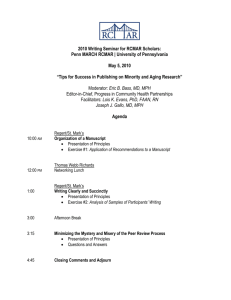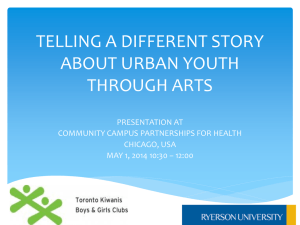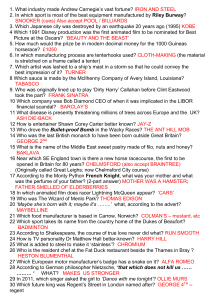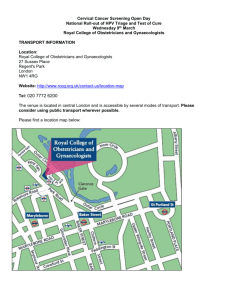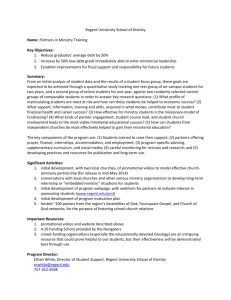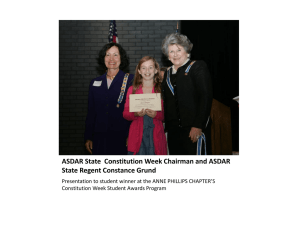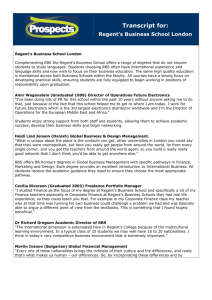Toronto Centre for Community Learning & Development (CCL&D)
advertisement
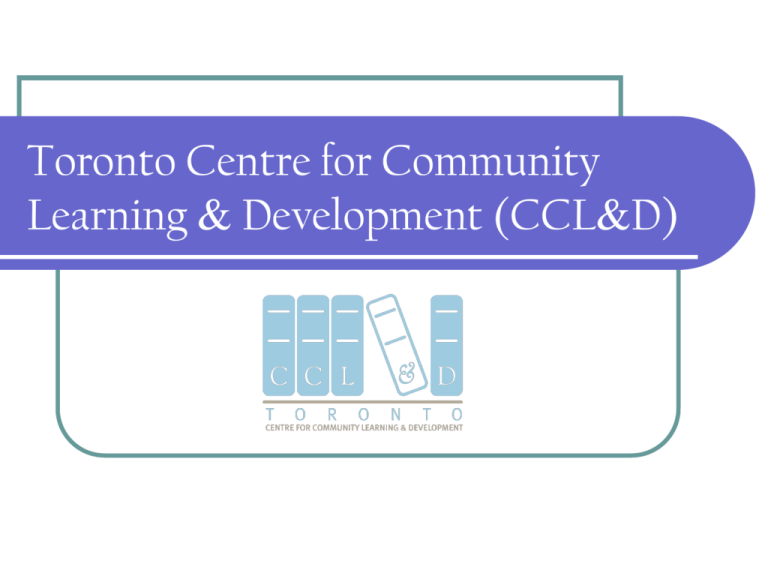
Toronto Centre for Community Learning & Development (CCL&D) Strong Communities Together WHO WE ARE: The Centre for Community Learning & Development (CCL&D) is a training and development organization that promotes increasing personal and collective resources as a strategy for building community capacity. CCL&D promotes the use of learning, digital storytelling, leadership development, and building healthy organizations, as vehicles for responding to community-based challenges, and promoting initiatives that lead to positive social change. VISION: “Strong Communities Together” MISSION: Creating a strong culture of community engagement through capacity building, progressive learning and innovative training. STRATEGIC PRIORITIES: Building high quality training/services relevant to today’s technologies. Collaborating through partnerships to develop change-oriented leaders, develop individual skills, and build community. Communicating the need for literacy and training and speaking out of clear language and design. Building a strong organization. CCL&D Board of Directors 2009-2010 Hanifa Mamujee , Board President Christine Hughes, Board Vice President Cynthia Leung Leolyn Hendricks Shinta Martina Jehane Adam Kathleen S. Keefe Thomas Jeung-Gyun Pak Sarita Bhatta-Ojha Anthony Curtis Brief History The Centre for Community Learning & Development (CCL&D), (formerly known as East End Literacy) was founded in 1979 as a community-based literacy organization serving downtown east Toronto. Over the past three decades, we have evolved to respond to changing community needs, including the growing demand for initiatives that promote active learning and active citizenship at the neighbourhood level. As a result, the organization’s work has expanded and includes adult literacy programs (academic upgrading), leadership training, community needs assessments, digital storytelling, and organizational development, in partnerships and communities across Toronto. CCL&D PROGRAMS AND ACTIVITIES CCL&D's programs and activities are designed and delivered as vehicles for responding to community-based challenges; promoting individual growth, and positive social change. Academic Skills Upgrading (Literacy & Basic Skills) Funded by the Ministry of Training & Colleges (Literacy & Basic Skills Program), upgrading is provided for adults who have a desire to improve their literacy and academic skills: reading, writing, numeracy, communication management, and computer skills, leading to further education and training, or employment. The program is student-centred, goal-oriented, and tailored to each individual’s learning needs. CCL&D PROGRAMS AND ACTIVITIES Immigrant Women Integration Program (IWIP): A one-year intensive training course for immigrant women with focus on community engagement and leadership development. Participants are trained to strengthen their analysis of issues, develop their knowledge of governance structures, build their capacity to organize, and participate in local organizations and/or public institutions. Trainees receive structured coaching and participate in sessions, dialogues, critical reflections and other activities to develop their skills, knowledge, attitudes and values. A 3-month internship is also included. CCL&D PROGRAMS AND ACTIVITIES CLAD is a public education program of CCL&D geared toward raising public awareness around the impact of inaccessible language on the population in general, but more specifically on people with low literacy skills. Through this service CLAD continues to work with public and private sector organizations (including pharmaceutical companies, the City of Toronto, Ministry of Health & Long-term Care, just to name a few) to help make their materials more accessible to their own staff and the general public. CLAD provides editing, writing, training, and consulting on a fee for service basis. Clear Language and Design CCL&D PROGRAMS AND ACTIVITIES CCL&D’s Digital Storytelling unit is an innovative partnership supporting the goal of assisting people in using the tools of digital media to craft, record, share, and value the stories of individuals and communities, in ways that improve lives. CCL&D PROGRAMS AND ACTIVITIES Capacity-builders.org Through Capacity-builders.org, CCL&D is able to engage in technical assistance partnerships that help develop resources and help strengthen capacity at all levels of an organization, including governance, management, staff, and policies, including guidance to various agencies and resident-driven organizations; strengthening leadership at all levels of the organization including access and equity. What’s new? Regent Park: Centre of Learning CCL&D is collaborating with several organizations, including University of Toronto, George Brown College, Ryerson University, Pathways to Education and Dixon Hall to open the Centre of Learning in the first phase of the Revitalized Regent Park. The Centre of Learning - a place to meet and learn. Where education turns dreams and hopes into realities. And where education changes lives and builds new futures - will provide a range of learning opportunities for residents of Regent Park. Regent Park: Centre of Learning Guiding Principles • Further enhance cultures of learning in the Regent Park community; Support social inclusion strategies and the promotion of community engagement; Participate in training related to community capacity-building; Facilitate opportunities for active participation in the areas of community and individual empowerment and improvement; Serve as a gateway to further educational opportunities (e.g. colleges, universities, apprenticeships) About Regent Park… In 2004, Regent Park was identified by The United Way as one of Toronto’s poorest neighbourhoods with an average income of $22,901 in comparison to a city-wide average of $54,399. This diverse community has an especially high number of new immigrants with over 50% of recent new immigrants coming from mainland China and Bangladesh. Other cultural communities include the Sri Lankan, Caribbean, Somali and Vietnamese. Forty-seven (47) languages are spoken in the area! A significant number of newcomer adults in Regent Park are highly educated, yet their qualifications are not always being recognized in Toronto. Despite the importance of continuing education, as identified by the residents of Regent Park, “adult learning systems remain complex, fragmented and incomplete,” and, like many communities across Canada, “access to learning opportunities… is generally poor for less-educated adults,” (Canadian Policy Research Networks, 2007). Regent Park families, like those in communities anywhere, “need streamlined and seamless access to information, intake, assessment and referrals to meet specific needs,” (Toronto Community Housing, 2007). The Centre for Learning… will provide a much needed one-stop space for Regent Park residents, current and new, to access information on learning and education opportunities. is the cornerstone of a vision to improve access to education, both formal and informal, and to be a gathering place for existing and new members of this diverse and vibrant community. will promote active citizenry, and link into opportunities for actual participation and engagement; ensuring that learning is relevant, purposeful and accessible to people as part of their everyday lives. will also link into wider networks, and encourage participants to contextualize their individual experiences in relation to those of people across Toronto. To this end, the Centre will engage in the following: Courses: These will be provided by a wide variety of agencies and will offer opportunities for residents both to pursue topics of general interest, and to acquire skills related to e.g. finding and holding jobs, writing, critical thinking, volunteering, and serving on boards of directors. Colleges and universities will provide courses, some of which will be for credit. Special Lectures and Seminars: The Centre will provide a place for public lectures, seminars, readings, and a neighbourhood forum. Academic Supports and Tutoring: Space in the Centre of Learning will be available for individual and small group tutoring; counselling about educational matters such as access, further education, financial support, and academic skills (e.g. literacy, numeracy, study skills, etc.) Drop-In: The Centre of Learning will be open as many hours a week as possible to serve as a drop in centre, where Regent Park residents with educational interests can meet each other, make use of Centre facilities, such as access to the Internet and reading materials. First-Stop Education Hub: The Centre of Learning will provide a much needed first-stop space for residents to access information on education opportunities and supports, including intake, assessment and referral processes. Information and referral databases will be maintained, as well as links to a wide range of educational facilities and opportunities in the community, and the city as a whole. Connection to Employment Hub: There is currently a pilot program of an employment hub - Regent Park Employment Engagement (RPEE) - located in Regent Park Neighbourhood Initiative’s office at 415 Gerrard Street East. The Centre and the Employment Hub will explore strategic linkages to ensure programs and services are seamless, complementary and part of a continuum of supports linking to employment for residents of Regent Park. Proposed Programs and Activities Centre for Community Learning and Development Academic Upgrading For individuals with a desire to improve their literacy and academic skills: reading, writing, numeracy, communication management, and computer skills, leading to further education and training, or employment. The program is student-centred, goal-oriented, and tailored to each individual’s learning needs. Communications, Management and Techniques CMT is an intensive, comprehensive six month self-direction/self-management course where participants are challenged to explore self and community relations through 4 foundational components: Self-Awareness, Tolerance & Diversity, Assertiveness, & Group Dynamics. Participants are engaged through collaborative group projects, independent presentations, creative writing, life skills coaching, and class discussions, utilizing face to face instruction and a variety of online learning tools. Dixon Hall Homework Club Volunteers provided by Dixon Hall will provide two tutoring/academic help sessions a week to assist the youth in Regent Park and its surrounding neighbourhoods in their school work. Entrepreneurial Development Seminar Series The Entrepreneurial Development Program would be aimed at adult newcomers in Regent Park who are interested in launching a small business. The programs primary aim would be to assist participants in writing developing a business concept and writing a business plan. The completion of a business plan is essential to the development and growth of any small enterprise and a key document required by potential lenders and investors. Participants would be assisted in this task through a series of weekly business seminars. These group learning sessions would be facilitated by a small business course instructor and tailored to meet the needs of emergent entrepreneurs. Participants would progress from refining their concept, to developing their marketing strategy, and completing a financial plan. They would also be provided assistance in honing their presentation skills and public speaking so they can effectively leverage their business plan with potential financiers, suppliers, and customers. Participants would also be matched with mentors to support their business activities after the program has been completed. George Brown College Academic Upgrading The Academic Upgrading program at George Brown College is free for students who need to upgrade their English, math and computer skills in order to prepare for postsecondary programs, further skills training for apprenticeship, or employment. Students are placed in courses according to assessment results and their academic or employment goals. Academic Upgrading includes LBS (Literacy and Basic Skills) 4 and 5, as well as ACE (Academic and Career Entrance, formerly Ontario Basic Skills), which includes English, Math, Self Management/Self Direction and afternoon programs in Chemistry, Biology and Physics. The Academic Upgrading program also offers academic and vocational counselling. Students may be eligible for a transportation allowance. Speaking with Confidence: General Education for Pathways Students This program will further enhance cultures of learning in the Regent Park Community, facilitate opportunities for active participation in the areas of community and individual empowerment and improvement and serve as a gateway to further educational opportunities. University of Toronto Liberal Arts and Business Courses The University of Toronto Learning Exchange Programme offers courses to post-teen Park residents on a variety of topics selected in dialogue with those in the Park. The courses are taught by professors from the University. Though the courses are non-credit ones, tutoring is provided for residents who seek post secondary educational opportunities. Also, future involvement of the University’s Transitional Year Programme will provide some pre-university credit courses as well. Child care and refreshments are provided as well as reading material free of charge. Centre for Learning: Preliminary Program Schedule Centre for Learning: The Advisory Committee Mission: To facilitate and foster learning partnerships, information sharing, innovation and creative thinking between community members and stakeholders in planning and maintaining the Centre for Learning. Description: The Advisory Committee’s primary function will be to maintain programmatic oversight, ensuring that the programs and activities remain true to our ideals, and helping with fundraising initiatives. The committee will draw membership from college and university sectors, residents, and agencies involved in community, adult and continuing education. This committee will provide a forum for sharing information, seeking input, developing advice and examples of outcomes, and opportunities for networking. Members: Community Agencies (Centre for Community Learning & Development, Dixon Hall, Pathways to Education) Educational Institutes (York University, Ryerson University, George Brown College, University of Toronto) Government Agencies/Organizations (Toronto Community Housing Corporation, Regent Park Employment Engagement Office) Community Residents Organizational Chart Dixon Hall Pathways to Education Toronto Community Housing Corporatio n Educational Institutes include… George Brown College Ryerson University University of Toronto York University Community Agencies Centre for Learning Educationa l Institutes Advisory Committee Community Residents Government Agencies/Org anizations Centre for Community Learning and Development
